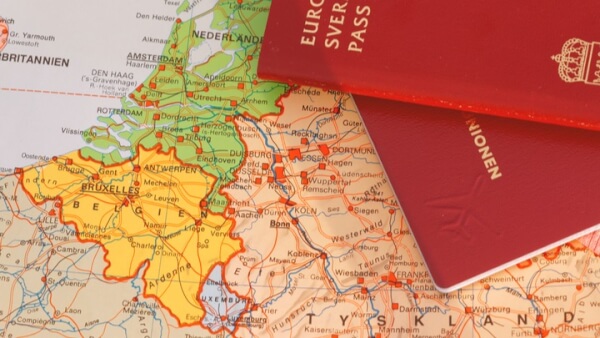Bank and public holidays in Belgium: 2017-2018 guide
Belgium is a melting pot of French, German and Flemish people, and that certainly affects the holidays that are celebrated in the country. Some holidays are...

***As the international headquarters of the EU and numerous international NGOs, Brussels is an attractive place for young professionals to work. Its international institutions aren’t only flourishing, but well-connected. A work placement in Brussels can open up doors both in Europe and the world. ***
While the opportunities to network are plentiful, you may also (depending on your home country) feel cozy in Brussels. With its big business culture, and famous french fries, Brussels is sometimes labeled as an Americanized city. Since the Second World War, Brussels has been at the forefront of rebuilding and restructuring the economy of Europe with models and examples in American economics and administration. Success speaks for itself, and in Brussels lie great monuments to scientific prosperity (the Atomium) and the utopian renaissance of Europe (the Headquarters of the EU).
If you’re interested in working in Brussels, follow the eight following steps to gaining that coveted position.
First, you'll need to determine whether you need a work visa. In Brussels, a work visa is the same thing as saying a permit, permis, or arbeidskaart (in French and Dutch). You can check out a handy Brussels work-permit wizard if you get stuck on figuring out which permit is right for you.
As a general rule, non-EU workers face more bureaucratic piles of paper while trying to get to work in Brussels. Citizens of member states within the European Union (EU) and the European Economic Area (EEA) in addition to Iceland, Liechtenstein, Switzerland and Norway, have an easier time.
If you’refrom outside the EU, there are three types of work visas (A, B, and C) in Brussels, and in Belgium as a whole.
The A Permit is the hardest to obtain, but the best in what it offers to workers. It allows an expat worker to stay in Belgium for as long as desired. However, the worker applying for the A Permit will need to prove four years' of employment experience in Belgium.
The B Permit allows a year of work in Brussels. It can be renewed though, after the year is over. You should prove residency with the B permit. Residency entails some planning as well as getting a residency permit arranged and finalized before the work permit. You’ll need to apply for a residency permit within eight days of arriving in Belgium.
When applying for the B Permit, try to remember to bring the following forms:
a medical certificate
a form stating personal details
a work contract
For the year 2017, the Belgian government also raised the salary requirements for applying to the B Permit.
The C Permit is the easiest to obtain. With this permit, you can be a temporary worker. In fact the C Permit is often given to employees who move around a lot like agricultural workers and students.
Other Permits
Lying outside of the three permits outlined above, there are rarer work visas that might be helpful for you. The following permits can get you on your feet in Brussels if you are highly skilled, young, or interested in specific or niche work.
If you are a highly-skilled employee already working with a Belgian company, and are paid an annual salary of 51,882 (EUR), you could qualify for a European Blue Card. This permit entitles you to several years of work provided it is regularly renewed.
If you want to work in Brussels as a self-employed worker and aren’t an EU/EEA/Swiss national, you can apply for what’s known as the Professional Card.
For young Canadians, Australians, and New Zealanders, a work permit isn’t necessary so long as your stay is defined as a year-long holiday. While you’re technically on holiday, even for as much as a year, you’re welcome to work.
Most of the employment sector in Brussels comes from the service industries. These include legal, tourism, banking, information and media. Be aware of the plentitude of company types: everything from the chocolatiers and confectioners Leonidas, and Vanparys, to the mining company Umicore.
Belgium has one of the highest minimum wages in Europe and Brussels is no exception to that rule: 1502€ and 1559€ for 21 and 22+ year-old workers, respectively, in 2015.
If you’re a foreign investor intrigued by Brussels or are otherwise interested in starting a business there, services are at hand to help you make the right choices. Impulse.Brussels is an agency that offers information to investors. Start-In-Brussels is an office management service that can help you with HR, legal issues, and finances.
If you have only English in your arsenal, take aim at temp agencies that help to place you in your chosen field of work. AngloInfo offers a great list of Brussells temp agencies. Generally speaking, your best bet as a foreigner with only English-language skills is going to be through one of these targeted services. If you’re still stuck, Actiris is another Brussels-based career finding agency with English-worker options you might want to check out.
However, getting a job usually requires speaking French or Flemish (also called Dutch because of its similarity to that language) or both. If you’d like to learn either, you can find a host of language courses offered in Brussels to help you acclimatize to the culture.
Maybe you've tried Indeed, Workopolis and the other common tools of the job hunter. Fortunately, there are Brussels-specific resources for finding work both online and in-person that it’s good to take a look through:
Brussels is the headquarters of many international NGOs. To find work in this exciting field, you can consult the website WANGO, which narrows down Belgian NGOs in the Brussels region.
While not exactly Brussels-specific, one of the best online resources for working in Europe is EURES. It is useful for finding work specifically in Brussels because EURES is affiliated with the European Commission, which has its headquarters in Brussels..
If you’re still struggling to find a suitable placement, here are some tips and resources to help you nail that elusive position.
First, be aware of what employers are looking for in terms of contracts. Brussels' employers are often looking for short-term contracts with foreigners. Laws in Brussels allow for granting workers new privileges once they stay for longer than a year, so many placements are limited by employers to six months.
If you aren't having luck finding long-term jobs, try looking for six month contracts. If you’re highly skilled, then by all means go for the longest contracts you can find!
Secondly, if you're getting nowhere from behind a computer screen, try networking with the following associations for a few pointers, help and maybe some helpful connections.
Brussels, being the linguistic hodgepodge that it is, will require some extra thinking when it comes time to write your CV. What language you’re writing your CV in is crucial. It conveys to your employer your intellectual, cultural and professional acclimatization with their world of work.
Whatever language you write in, be sure to follow these basic rules.
Try to start your CV with the standard personal details.
Follow this with work experience, education, language, personal activities (like hobbies and volunteering), and references.
If you feel overwhelmed, check out Expatica’s sample CV and follow their guidelines.
If you need some pointers on precisely formatting everything in a Belgian style, take a look CV Layout tips and a sample cover letter created by the government of Flanders.
You’ll probably be writing your CV in English, but if you do happen to know French or Flemish, read on.
Here is an essential rule of thumb: respond to an advertisement with a CV in the same language. If you saw an advertisement in French, then write your CV in French. The same process goes for Flemish or English. This is to avoid offending a potential employer who might be disappointed to see you’ve shrugged off their preferred language.
Brussels' format for interviews relies on many of the same skills you’d need elsewhere in the Western world: dressing formally, shaking hands with your interviewer and burying your phone deep in your pockets. But if you dig deeper, there are other common sense behaviours that only Brussels natives are totally aware of. Brussels' basic interview faux-pas can be counteracted by demonstrating the following inter-personal skills.
Show yourself in as honest and direct a way of speaking as possible. This means no vague bluffing about skills and abilities without reference to their real-world application in past employments and experiences. This is true of any job: don't exaggerate yourself. Even while you're selling yourself, there's no need to brag. But it's particularly true in Brussels, where Belgian culture dictates that you speak plainly and directly with people. Belgians appreciate forthrightness because it lends itself to communication and the free exchange of knowledge. Your interviewer in Belgium will no doubt appreciate in your style of talking, (and in your self-descriptions) any evidence of deal-making, negotiation, and teamwork.
We always knew you could do it, and so did you! You’ve found that work placement or career in Brussels after all your hard work and get to start the process of adapting to expat life in the Netherlands. Once you've got a job lined up, if you still need help finding a place to stay, then check out Expats in Brussels’ accommodations guide.
When you do make this move and may need to send money outside the country to friends or family, consider using Wise.
Not only does Wise use the real mid-market exchange rate to convert your money (which nearly always beat the banks), but because your money is received and sent via local bank transfers in both your home country and in Belgium, all those nasty international fees magically disappear. Give it a try.
Good luck!
*Please see terms of use and product availability for your region or visit Wise fees and pricing for the most up to date pricing and fee information.
This publication is provided for general information purposes and does not constitute legal, tax or other professional advice from Wise Payments Limited or its subsidiaries and its affiliates, and it is not intended as a substitute for obtaining advice from a financial advisor or any other professional.
We make no representations, warranties or guarantees, whether expressed or implied, that the content in the publication is accurate, complete or up to date.

Belgium is a melting pot of French, German and Flemish people, and that certainly affects the holidays that are celebrated in the country. Some holidays are...

Brussels is usually seen as the perfect location for expats wanting to explore Europe in their spare time. Sometimes called the “capital of Europe”, Belgium...

Brussels is the de facto capital of Europe, and with many European institutions and global businesses based there, it’s become a hub of expat activity. A...

Belgium is one of Europe’s foremost financial and political centres, drawing in expats from all over the world to work in Brussels and beyond. With large...